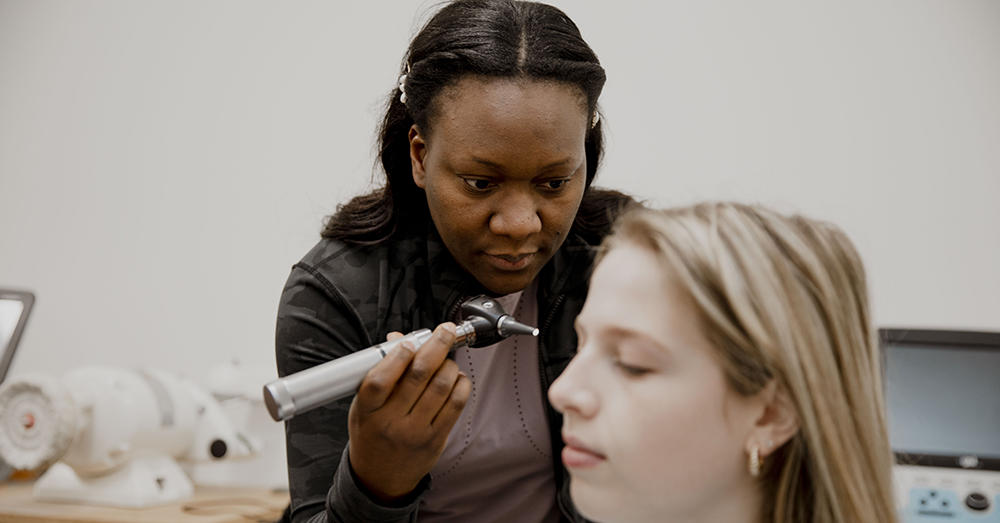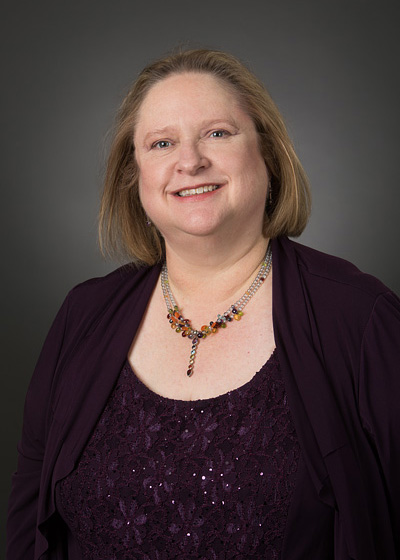A Key Part of Educational Audiology at TTUHSC: Exploring the Lubbock Regional Day School Program for the Deaf
Educational audiologists are major players in positive change for people with communication disorders.

To help raise awareness of better hearing and speech, we spoke with Tori Gustafson, AuD about how the TTUHSC Doctor of Audiology Program supports the fantastic work being accomplished at the Lubbock Regional Day School Program for the Deaf (RDSPD). We also discussed the shortage and need for educational audiologists.
Gustafson is an Associate Professor of Speech, Language and Hearing Sciences and has worked with TTUHSC since 1993.
Educational Audiology

Tori Gustafson, AuD
Educational audiologists provide a full spectrum of hearing services to all children, particularly in educational settings. Audiologists are trained to diagnose, manage and treat hearing and balance problems. Typically, educational audiologists are members of the school multidisciplinary team, who facilitate listening, learning and communication access via specialized assessments and management.
Educational audiologists also provide evidence for needed services and technology, emphasize access skills and support, counsel children to promote personal responsibility and self-advocacy, maintain student performance levels, collaborate with private sector audiologists, help student transitions and team with other school professions to work most effectively to facilitate student learning.
“Early intervention means they have better communication,” Gustafson says. “The better the equipment and the more we work with the teachers to make sure the students have everything they need, it’s amazing how much of a difference we can make for the children in being able to communicate.
“Children with disabilities can begin working with an educational audiologist at age 3 and can be served through graduate school and vocational training,” Gustafson continues. “We can see them all the way up to age 21.”
The Need for Educational Audiologists
“Educational audiology is an underserved population,” Gustafson says. “In 2003, in Texas, only 10 percent of audiologists worked in educational settings.”
The American Speech-Language-Hearing Association (ASHA) recommends one educational
audiologist for every 10,000 students. Texas is at a ratio of around 1 per everyone
100,000 students.
Why the disparity?
“Texas is a large state and very spread out, and that makes it difficult to have audiologists providing services,” Gustafson explains.
Furthermore, not all universities include courses in educational audiology as a part of their doctorate programs.
“It’s special that we (TTUHSC) offer this course and clinical rotation,” she says.
And the setting of rural West Texas means that audiology students gain exposure to a wide variety of issues and students.
“The reward of helping in a rural community is a hallmark of the Health Sciences Center,” Gustafson says. “We have a hub for health and can loan equipment.”
The Lubbock Regional Day School Program for the Deaf (RDSPD)
TTUHSC contracts with the RDSPD, a state funded program providing services for deaf and hard of hearing students who live in the 20-county area around Lubbock. Their focus is to provide specialized intervention toward maximizing communication development for students.
“They (RDSPD) service a wide range of schools, and we go almost weekly to Overton Elementary, Irons Middle School and Coronado High School,” Gustafson says. “We also provide itinerant services for children with hearing loss.”
Program staff begins working with families as soon as the student is identified as deaf or hard of hearing. A parent-infant teacher, coordinated with ECI services, works with the parents and babies in their homes. Intervention considerations for all students include sign language training, amplification, auditory training, speech and language development and counseling.
Provided services include:
- Helping to determine eligibility for deaf and hard of hearing services
- Checking hearing aids, osseointegrated devices, and cochlear implant equipment
- Fitting and maintaining hearing assistive technology systems (HATS)
- Speechreading assessments
- Assessing and supporting the child in advocacy
- Examining the impact of the hearing loss on communication and social interaction
- Helping facilitate STAAR testing for the children with hearing loss
“We have a very good interprofessional relationship with the teachers,” Gustafson says. “They troubleshoot and tell us about specific student situations and needs.”
Imagine unlocking a child’s ability to communicate. Imagine hearing a child who has
struggled with speech and hearing complications their whole lives saying their first
words or using their first signs.
That’s the kind of impact one can have as an educational audiologist, and it’s the
impact that the Lubbock RDSPD and TTUHSC are making every day.
Related Stories
The John Wayne Cancer Foundation Surgical Oncology Fellowship Program at Texas Tech University Health Sciences Center Announced
TTUHSC is collaborating with the John Wayne Cancer Foundation and has established the Big Cure Endowment, which supports the university’s efforts to reduce cancer incidence and increase survivability of people in rural and underserved areas.
Making Mental Health a Priority in the New Year
Sarah Mallard Wakefield, M.D., a psychiatrist with Texas Tech Physicians, talks about strategies to combat widespread and growing anxiety.
TTUHSC Dean to be Inducted into the National Academies of Practice as Distinguished Fellow
Gerard E. Carrino, Ph.D., MPH, dean of the TTUHSC Julia Jones Matthews School of Population and Public Health, will be inducted into the National Academies of Practice (NAP) as a Distinguished Fellow of the Public Health Academy.
Recent Stories
The John Wayne Cancer Foundation Surgical Oncology Fellowship Program at Texas Tech University Health Sciences Center Announced
TTUHSC is collaborating with the John Wayne Cancer Foundation and has established the Big Cure Endowment, which supports the university’s efforts to reduce cancer incidence and increase survivability of people in rural and underserved areas.
TTUHSC Receives $1 Million Gift from Amarillo National Bank to Expand and Enhance Pediatric Care in the Panhandle
TTUHSC School of Medicine leaders accepted a $1 million philanthropic gift from Amarillo National Bank on Tuesday (Feb. 10), marking a transformational investment in pediatric care for the Texas Panhandle.
Texas Tech University Health Sciences Center Permian Basin Announces Pediatric Residency Program Gift
TTUHSC Permian Basin, along with the Permian Strategic Partnership and the Scharbauer Foundation, Feb. 5 announced a gift that will fund a new pediatric residency.
